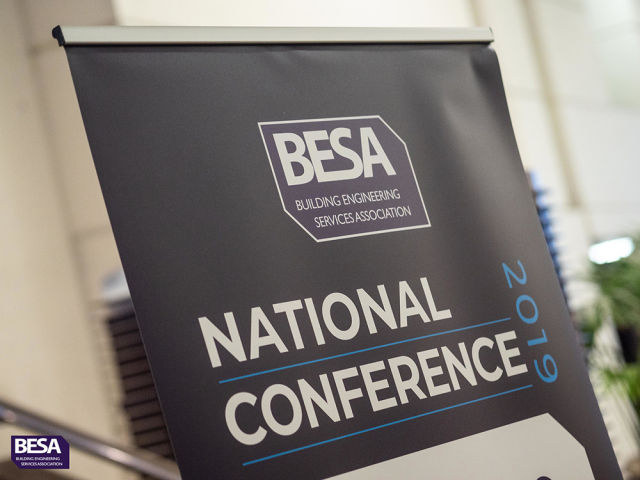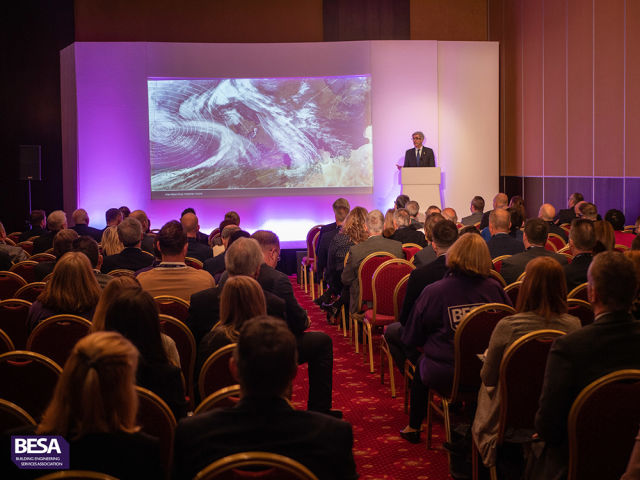Shaping the future

Brexit might have been dominating the news in recent months, but there was no shortage of other talking points at the annual BESA National Conference 2019 which took place in London on 21st November. Matt Brooks reports.
“Brexit eats bandwidth for politicians, they have no time to listen to us,” were the words of BESA chief executive David Frise at the opening plenary session of this year’s BESA National Conference in London. Some of the big UK issues he identified were climate change; the building performance gap; ensuring high standards in delivery of building services; and demonstrating competence. These have taken a back seat with MPs over the past few years.
However, in order to create real change, the construction industry does need Westminster to make regulations that support the sector as well as its goals on cutting emissions. But as Frise pointed out, this requires the sector to take a proactive approach: “We need to go to politicians with easy solutions,” he said. The construction sector has attracted attention at Westminster over the past few years, though not for the best reasons. This may be a way in for the industry. “They (politicians) don’t want another Carillion and will do everything they can do to stop another one,” explained Frise.
The Grenfell Tower tragedy has also focused minds at Westminster. And the Hackitt Report certainly put the spotlight on the performance of the construction sector as key to ensuring safety. Following Dame Judith Hackitt’s critique of the industry, politicians are well aware that improvements are needed.
As a result of these issues and others such as changing technologies and the drive to modular construction, Frise pointed to a coming ‘revolution’. He warned that the building services sector would do better to lead the way on changing its practices than to have change enforced: “It is better to take part in a revolution than to have one come for you.”
The issues were raised throughout the conference by other speakers. On the fire safety panel, the group discussed how the industry can implement the post-Grenfell recommendations. It particularly touched on the crucial role of fire damper maintenance and ventilation hygiene. Niall Rowan, chief executive of the Association of Specialist Fire Protection, observed that there was not enough inspection or enforcement for passive fire protection products that are invisible when installed: “A lot of it is making it up as you go along,” he commented.
Barry Turner, director of Technical Policy for Local Authority Building Control (LABC), described serious problems for regulations on fire protection, saying: “Regulation enforcement became a regulation service.” He further agreed with the conclusion of the Hackitt review that the current approach is not the best way to ensure
Lack of maintenance was observed as a problem by the panel and Turner offered his thoughts on a solution: “People need to know what was designed, why it was designed, and about any changes made to the building. Do the people in the buildings understand how to use it? It needs to be a part of the design process.” Turner also knows of current work being done to raise standards: “Industry has been working on a competency framework. I believe it should work across the construction industry, not just a sector.”
Air pollution, which was mentioned in Frise’s opening speech, was a key topic in the session on ‘Wellbeing in Buildings’. Nathan Wood, BESA Health and Wellbeing Group chair, said: “The principle factor for your wellbeing is determined by the quality of air you breathe.”
Rosamund Kissi-Debrah, a WHO advocate for health and air quality, spoke about how her daughter died from an asthma attack in an area with poor air quality. She urged the audience: “Please don’t cut corners. Somebody somewhere will pay the price.” A BESA ‘Safe Havens’ campaign was launched by her to promote buildings to protect occupants with indoor clean air zones.

The issues of training and competence were also raised during a discussion on ‘The future of cooling’. One of the most important predictions was that cooling and heating in buildings. Phillip Ord, the head of marketing and sales strategy for Mitsubishi Electric, said: “The future of cooling is linked with the future of heating.”
The key drivers for this convergence are the move towards electric heating, with a particular focus on heat pumps; and F Gas regulation which is broadening the range of refrigerants being used in air conditioning systems and heat pumps for heating and cooling.
The Committee for Climate Change has recommended that 19 million heat pumps will be needed by 2050 and over a million will have to be installed by the mid 2030’s in order to meet net zero emissions by 2050. This is the target for the current government – the manifestos of other political parties are aiming to reach the target sooner.
With a more complex refrigerant market and a major demand for heat pumps on the near horizon, finding the right people to deliver the technology is key. Graham Wright, chairman of the Heat Pump Association (HPA), said: “The biggest issue we have is with training. We need qualified people to do the job.”
The end of the Conference plenary session brought together the main strands of the day. One of the most important points raised was that the building services sector will be much better served if it works to improve itself. As David Frise pointed out, it is much better to do this than to have someone else impose standards from outside the industry, or worse, to continue without standards: “If we don’t set this standard, no one will.”
One thing is abundantly clear from this year’s BESA National Conference: The industry has many opportunities to grasp, but it must first take action on education, competence and standards. Once these are in hand, this is a sector that can also greatly improve quality of life for its customers and the wider community. As David Frise said: “Today is about what we can do to make this work for everybody, as well as ourselves.”







